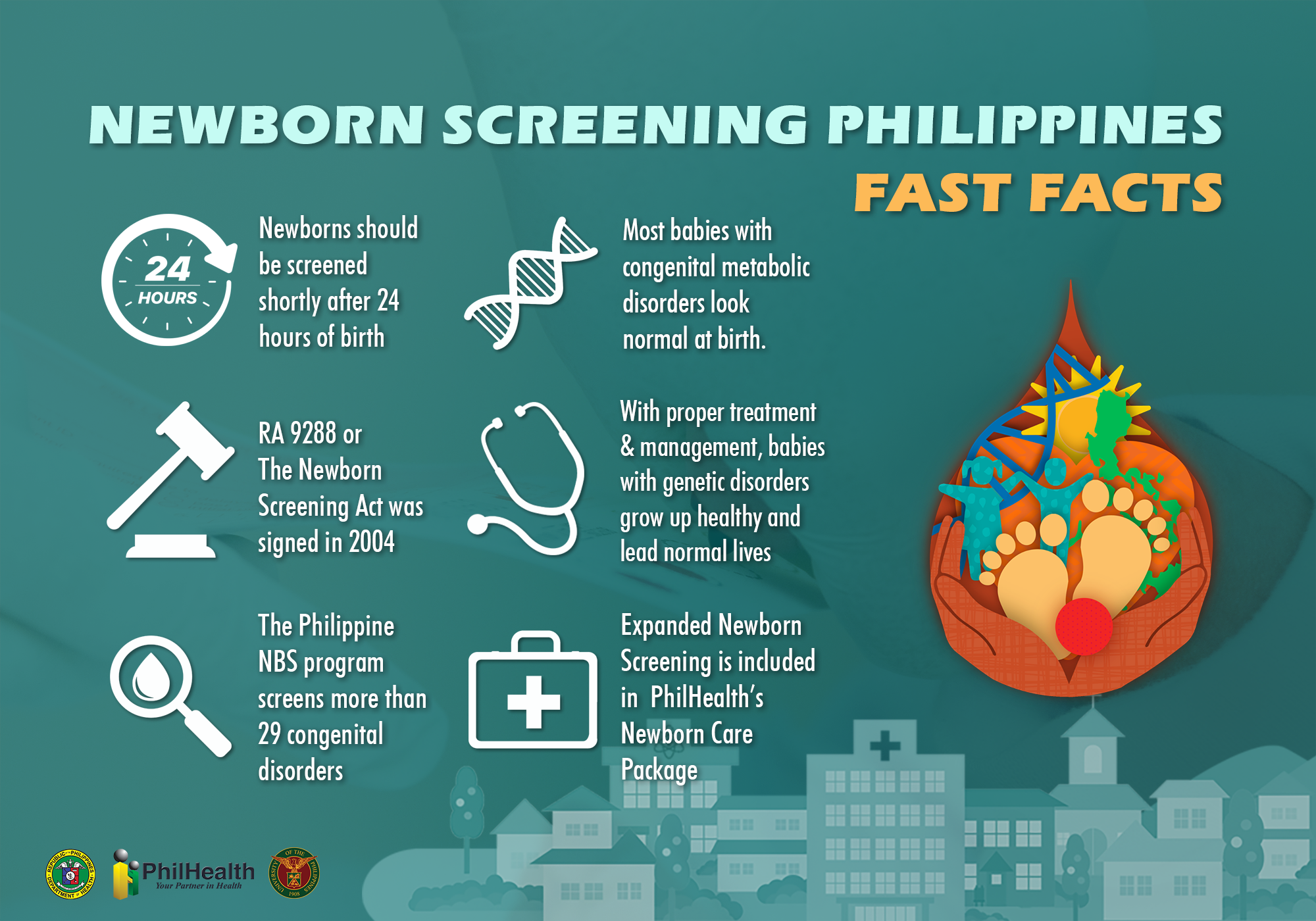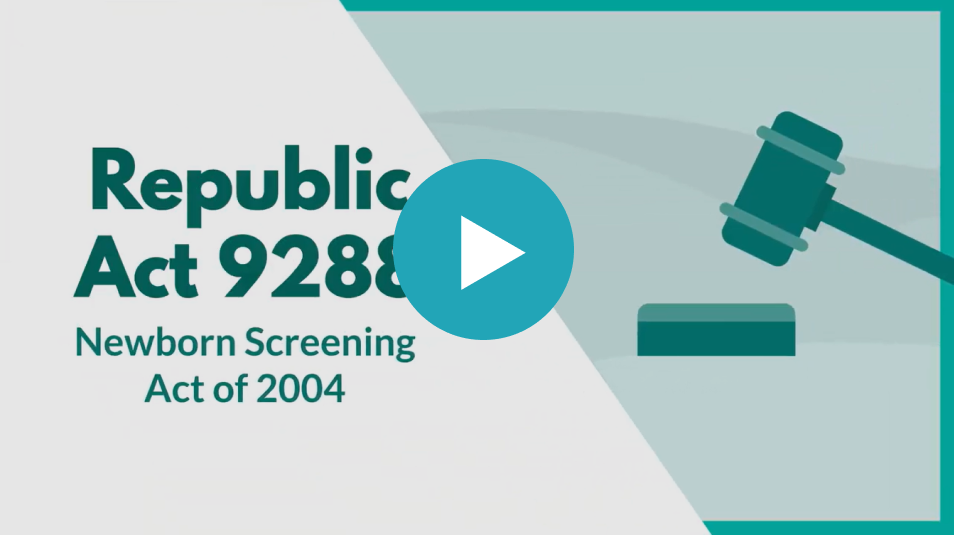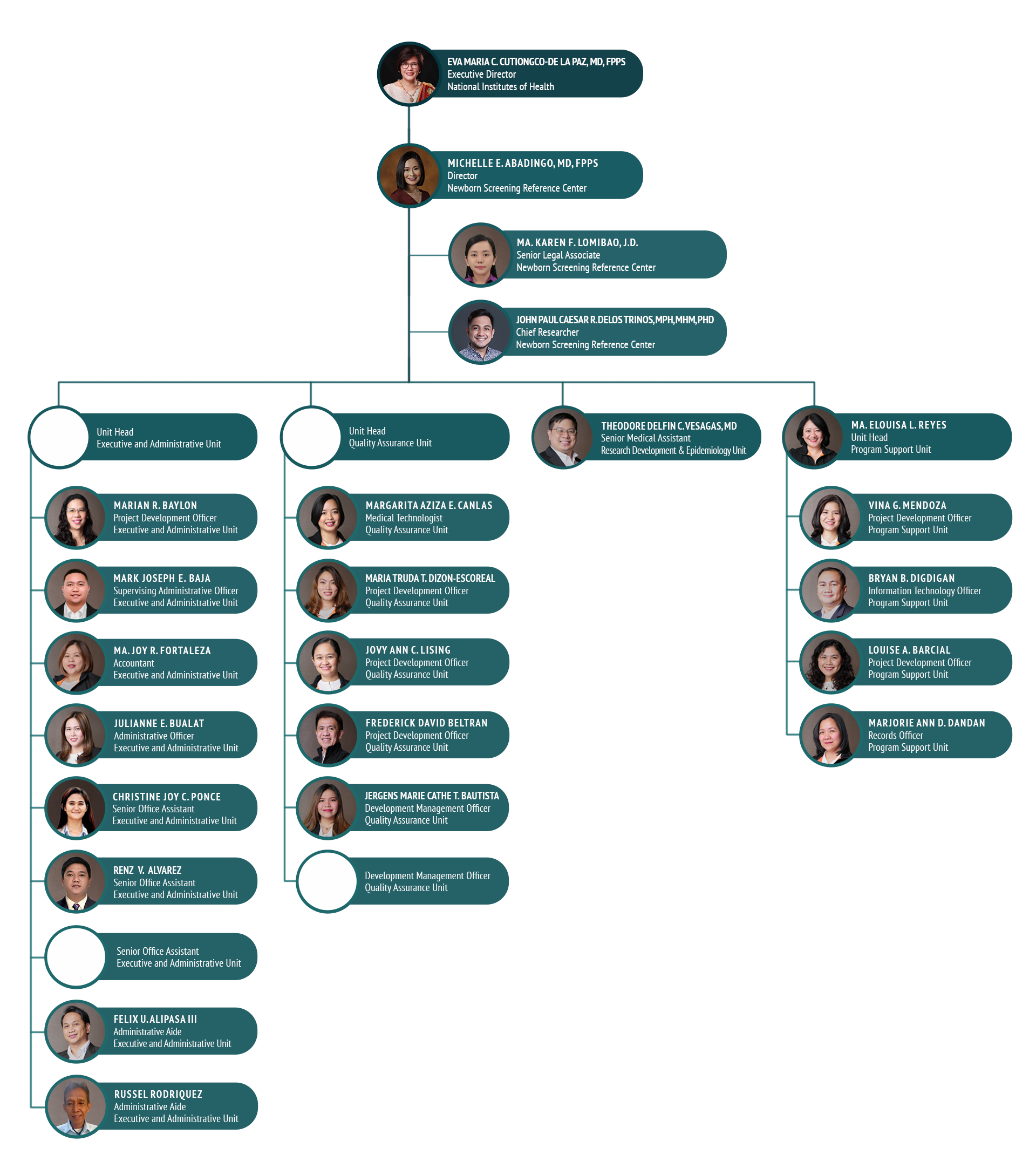NEWBORN SCREENING PROGRAM
NEWBORN SCREENING is a national public health program for the early identification of disorders. It is a simple procedure to find out if your baby has a congenital disorder that may lead to mental retardation or even death. Shortly after 24 hours from birth, a few drops of blood are taken from the baby’s heel, blotted on a special absorbent filter card, and sent to Newborn Screening Centers (NSC) for testing.


ABOUT NSRC
The Newborn Screening Reference Center (NSRC) is an office under the National Institutes of Health (NIH) University of the Philippines Manila, created under RA 9288. NSRC provides technical assistance to the DOH-NIH network in reaching the ultimate goal of screening Filipino newborns for common life-threatening heritable disorders. NSRC provides information and resources in the area of newborn screening to benefit health professionals, the public health community, consumers, and government officials.
Opportunities
Careers
We believe that you bring with you unique skills and talent that can help improve and develop the newborn screening program. We are actively seeking the best talent to join our organization. |
NEWBORN SCREENING PROGRAMNEWBORN SCREENING is a national public health program for the early identification of disorders. It is a simple procedure to find out if your baby has a congenital disorder that may lead to mental retardation or even death. Shortly after 24 hours from birth, a few drops of blood are taken from the baby’s heel, blotted on a special absorbent filter card, and sent to Newborn Screening Centers (NSC) for testing. |
Why screen your baby?
The table below shows the potential effects of a screened and managed newborn versus one who did not receive NBS services.
| DISORDER | Effect if NOT SCREENED | Effect if SCREENED AND MANAGED |
|---|---|---|
| ORGANIC ACID DISORDERS |
|
|
| ENDCORINE DISORDERS |
|
|
| FATTY ACID OXIDATION DISORDER |
|
|
| HEMOGLOBINOPATHIES |
|
|
| UREA CYCLE DEFECT |
|
|
| AMINO ACID DISORDERS |
|
|
Frequently Asked Questions
- What is newborn screening?
Newborn Screening (NBS) is a simple procedure to find out if your baby has a congenital disorder that may lead to mental retardation or even death if left untreated.
- What is Expanded Newborn Screening (ENBS)?
The expanded newborn screening program increased the screening panel of disorders from six (6) to more than twenty-eight.
- Why is it important?
Most babies with metabolic disorders normal” at birth. By doing ENBS, metabolic disorders may be detected even before clinical signs and symptoms are present. As a result of this, treatment can be given early to prevent consequences of untreated conditions. *
- When is it done?
ENBS is ideally done immediately after 24 hours from birth.
- How is it done?
A few drops of blood are taken from the baby’s heel, blotted on a special absorbent filter card and then sent to Newborn Screening Center (NSC).
- Who will collect the sample for ENBS?
The blood sample for ENBS may be collected by any of the following: physician, nurse, medical technologist or trained midwife.
- Where is ENBS available?
ENBS is available in hospitals, lying-ins, rural health units, health centers, and some private clinics.
- How much is ENBS?
Expanded newborn screening costs ₱1750 and is included in the Newborn Care Package (NCP) for PhilHealth members.
- What is Newborn Care Package?
NCP is a PhilHealth benefit package for essential health services of the newborn during the first few days of life. It covers essential newborn care, expanded newborn screening, and hearing screening tests.
- What are the eligibility conditions for newborn to avail of the NCP?
Newborns are eligible for NCP if ALL of the following are met:
- Either parent is eligible to avail of the benefits,
- Born in accredited facilities that perform deliveries, such as hospitals and birthing homes; and
- Services were availed of upon delivery.
- How can results be claimed?
Results can be claimed from the health facility where ENBS was availed. Normal ENBS results are available by 7 – 14 working days from the time samples are received at the NSC.
Positive ENBS results are relayed to the parents immediately by the health facility. Please ensure that the address and phone number you will provide to the health facility are correct.
- What is the meaning of the newborn screening result?
A NEGATIVE SCREEN means that the ENBS result is normal.
A POSITIVE SCREEN means that the newborn must be brought back to his/her health practitioner for further testing.
- What must be done when a baby has a positive ENBS result?
Babies with positive results must be referred at once to a specialist for confirmatory testing and further management.
- What happens to the dried blood samples after screening?
After the dried blood spot has been tested, it will be stored in a secure locked area. The stored sample is retained to allow for normal quality assurance and may be used for ethics committee approved research for the benefit of the public.
- What is the difference between screening and confirmatory tests?
Screening and confirmatory are two different tests and may produce different results. A screening test is done to identify the population at HIGH RISK while the confirmatory test either CONFIRMS or RULES OUT a condition in newborns with an out-of-range screening result.
- Why is a second test for preterm, LBW, or sick babies required at day 28 of life?
A number of factors, including infant condition, treatment, and maternal status, increase the risk of missed or unreliable testing for premature, low birth weight, and sick newborns ( e.g. abnormal results such as elevated amino acids may resolve at 28 days of life; thyroid function may have matured to expected levels at 28 days of life.) Initial screening cannot wait for 28 days because the goal of screening is to identify and treat every affected infant before the onset of symptoms, as it can result in irreversible mental and physical damage. Hence, there is a need to repeat their NBS on the 28th day of life to ensure the reliability of results. There are also numerous published international and local studies to back up this protocol.
- Where do we get the confirmatory testing results?
Contact the facility that collected/sent the samples for confirmatory testing (e.g. Newborn Screening Center for Hemoglobinopathies, Thalassemia, and Metabolic Disorders; G6PD Confirmatory Testing Center for G6PD deficiency, etc.).
- Is newborn screening test different from newborn hearing test?
Newborn Screening is a simple blood test to find out if your baby has a congenital disorder that can lead to intellectual disability or even death if left untreated.
Newborn HEARING Screening test on the other hand, is a non-invasive test used to detect hearing loss in newborns using a tool called Otoacoustic Emissions (OAE) or Automated Auditory Brainstem Response (AABR). For more information about the hearing screening test, please visit http://www.nhsrc.ph or ask your doctor about it.
*Long term follow-up and management of children with confirmed newborn screening conditions ensure that these children receive the full benefits of early identification through newborn screening
Interested to know more about the disorders screened by NBS? Download brochures and fact sheets here: Resources
About NSRCThe Newborn Screening Reference Center (NSRC) is an office under the National Institutes of Health (NIH) University of the Philippines Manila, created under RA 9288. NSRC provides technical assistance to the DOH-NIH network in reaching the ultimate goal of screening Filipino newborns for common life-threatening heritable disorders. NSRC provides information and resources in the area of newborn screening to benefit health professionals, the public health community, consumers, and government officials. |
Organizational Chart
Functions of NSRC
As stipulated in the Newborn Screening Act of 2004, the NSRC shall be guided by the following functions:
- be responsible for the national testing database and case registries, training, technical assistance and continuing education for laboratory staff in all Newborn Screening Centers
- define the testing and follow-up protocols for Newborn Screening Centers (NSCs) to be established in strategic locations in the country
- maintain an external laboratory proficiency-testing program
- oversee the national testing database and case registries
- report to the BHFS the NSCs found violating these rules and regulations and those performing and providing NBS procedures and services without any DOH accreditation
- participate in consultation and evaluation activities initiated by BHFS in relation to the NSRC and the NSCs performance and in improving implementation of these rules and regulations.
Role of NSRC
RA 9288 or the Newborn Screening Act of 2004 mandates the National Institutes of Health, University of the Philippines to create the Newborn Screening Reference Center (NSRC). The NSRC is responsible for the national testing database and case registries, training, technical assistance, and continuing education for laboratory staff in all Newborn Screening Centers. Section 14 of the same article also stipulates that Newborn Screening Reference Center shall be responsible for the Quality Assurance of the National Comprehensive Newborn Screening System of the Country.
The NSRC provides technical assistance to the DOH-NIH network in reaching the ultimate goal of screening Filipino newborns for common life-threatening heritable disorders. NSRC, together with the Bureau of Health Facilities and Services (BHFS) of the DOH, ensures that quality services are provided to babies screened. The NSRC assists DOH in establishing Newborn Screening Centers (NSCs) in geographically located areas. All NSCs will comprise a newborn screening laboratory and will be equipped with a follow up program that is linked with the DOH.
MISSION
The Newborn Screening Reference Center of the University of the Philippines – National Institutes of Health ensures all Filipino children will have equitable access to comprehensive quality care for their optimal growth and development through training, education, advocacy, policy development, research and quality management systems.
With access to state of the art technologies, expertise and years of experience, we will ethically manage our resources to be able to achieve sustainability of our socially responsive programs, providing excellence, innovations and a competent human resource.
VISION
The Newborn Screening Reference Center, UP National Institutes of Health, is the principal resource of evidence for policy development and programs on newborn screening and its universal, equitable, and inclusive access to all Filipinos by 2028.
NSRC Quality Policy
Contact Us
Department of Health
Children’s Health Development Division
- Disease Prevention and Control Bureau
- San Lazaro Compound, Sta. Cruz, Manila
- Contact Number: (02) 8-651-7800, local 1728
For Training/Orientation, kindly contact the DOH-Regional Newborn Screening Team through the following contact numbers:
| REGION | CONTACT DETAILS | NBS PROGRAM MANAGER | NURSE COORDINATOR |
|---|---|---|---|
| 1 Ilocos | (072) 2424773 loc 126 | Justin Clyde R. Gubatan | Nicole Marie S. Bugarin, RN
Jun Ian Balancio |
| 2 Cagayan Valley | (078) 3046585 | Anabelle S. Sanchez, MD | Novelyn C. Lacuanan, RN,MPBM-PA |
| 3 Central Luzon | (045) 8613428 loc 112 | Janet T. Miclat, MD | Jean Canlas, RN
Mark Kevin C. Ramos |
| CAR | (074) 4428096 loc 132; (074) 4445255 | Anachris M. Kilakil, MD, MPM | Rey Percival B. de Jesus, RN |
| NCR | (02) 8-5310037 | Katrina Lea Lavado-Pike, MD | Janice C. Acosta, RN
Mark Christian Paez, RN Christine Jay Agatep, RN |
| 4A CALABARZON | (02) 8-4403372 | Jenica Querido, RN | Jose Antonio Yap, RN, MPH
Jhoanna Gatbonton, RN, MPH Paul Vincent Santos, RN |
| 4B MIMAROPA | (02) 8-9115025; (02) 8-9120195 loc 138 or 143 | Mathew R. Medrano, MD | Fe Laarni Camayang, RN |
| 5 Bicol | (052) 4835959 (052) 4835656 (052) 4830840 loc 512 | Twinkle Jean P. Lorilla, RM | Margaret Estevez-Ani, RN
Sherelyn A. Cantonjos, RN |
| 6 Western Visayas | (033) 3210364 / 3213673 | Gem Laurie Borja, MD | Florence May Osano, RN
Camille Arianne S. Masculino, RN |
| 7 Central Visayas | (032) 2540109 | Faith Ronolo, MD | Jaika Jel Besira, RN, MMHA
Jamaica Area Seno, RN |
| 8 Eastern Visayas | (053) 3235044 | Milagro Salvacion Bolito, MD | Adrian Rey Ortiz, RN |
| 9 Zamboanga Peninsula | (062) 9830314; (062) 9830315 | Apryl Joy C. Gresones, RN, MPM | Ivy Sanson, RN |
| 10 Northern Mindanao | (088) 8587123 | Pauline Angela F. Balansag, RN | Serge Jude Vidal, RN |
| 11 Davao Region | (082) 2243011; (082) 3051907 | Francine Adrienne P. De Castro, MD | Angelica Nina Angliongto, RN
Rhoebelle Ann R. Balio, RN |
| 12 SOCCSSKSARGEN | (064) 4214726 | Rohainna M. Mua, RN, MPA | Maria Mae C. Pretesto, RN
Omairah Sarifa A. Ayao, RN |
| 13 Caraga | (085) 3411595; (085) 3425208 loc 115 | Sharon S. Coja, RMT, RN. MMPSM | Daniel C. Montilla, RN |
| ARMM | (064) 4217703 | Sheridan A. Sampulna, RN |
Continuity Clinics
| REGION | HOST FACILITY | MEDICAL SPECIALIST | NURSE | CONTACT DETAILS |
|---|---|---|---|---|
| I
Ilocos Region |
Ilocos Training and Regional Medical Center | Ivy Rose C. Valdez-Acosta, MD | Vanessa B. Mabalo, RN | itrmc.cc@gmail.com
09176312349 |
| Mariano Marcos Memorial Hospital and Medical Center | Judy R. Pipo-Deveza, MD, FPPS, FNSP, FPNA | Thricia Bless S. Ventura | mmmhmc.cc@gmail.com
09296087917 |
|
| Region 1 Medical Center | Alma R. Estrada, MD | Mary Glenid P. Palisoc, RN | r1mc1.cc@gmail.com
09124494768 |
|
| II
Cagayan Valley |
Cagayan Valley Medical Center | Grandelee D. Taquiqui, MD | Ma. Cristina S. Calimag, RN | 0917-631-4532 |
| Southern Isabela Medical Center | Nori Jane G. Aroc MD | Jingky C. Lorenzo RN | simc3.cc@gmail.com
09761335471 |
|
| CAR
Cordillera Administrative Region |
Baguio General Hospital and Medical Center | Sharon B. Gawigawen, MD | Florenz Ronielo G. Nastor, RN | bghmc.cc@gmail.com
09176321486 |
| III
Central Luzon |
Jose B. Lingad Memorial General Hospital | Maria Victoria L. Macalino, MD | Maria Francesca P. Retomarta, RN | jblmrh.cc@gmail.com
09176314346 |
| Dr. Paulino J. Garcia Memorial Research & Medical Center | Ma. Lourdes Bernadette D. Trinidad, MD,DPPS, DPSNbM | Irish F. Talion, RN | pjgmrmc.cc@gmail.com
09171035330 |
|
| Bulacan Medical Center | Barbara A. Gatiera, MD | Maria Danica C. Rivera, RN | bmc4.cc@gmail.com
09479337439 |
|
| NCR
National Capital Region |
Philippine General Hospital | Michelle E. Abadingo, MD | Gellie Ann E. Golfo, RN | pghpedia.cc@gmail.com
0917-623-9111 |
| Philippine Children’s Medical Center | Teresa F. Bag-ao, MD, DPTS | Shereen C. Blaza, RN | pcmc1.cc@gmail.com
09058582057 |
|
| IV-A CALABARZON | General Emilio Aguinaldo Memorial Hospital, 3Quezon Medical Center, Batangas Medical Center,Dr. Jose P. Rizal Memorial District Hospital | Laura Maria Soledad A. Aguinaldo, MD, Dr. Josephine Leiya Marie F. Salud-MasangaLovely Joy M. Divina RN, Carolyn I. Boongaling , MD, FPPS, FPSPMEJulia B. Silang, RN, MAN, Jedeane M. Aragon, MDKimberly N. Llamas, RN | Jhonalyn D. Bantigue, RN | geamh.cc@gmail.com nbsccregion4a@gmail.com 09176314883 qmc1.cc@gmail.com09152822459 batmc.cc@gmail.com 09171135128 djprmdh.cc@gmail.com 09365361604 |
| IV-B MIMAROPA | Oriental Mindoro Provincial HospitalMichelle Mutiangpili, MDSheerlove U. Villaruel | omph1.cc@gmail.com 09759176790 | ||
| V Bicol Region | Bicol Regional Hospital and Medical CenterMarive A. Bicol Medical CenterMichelle R. Semana, MD, FPPSHoneychille N. Repane, RN,LPT | Flores- Declaro, MD Mary Joy M. Rebueno, RM, RN | brtth.cc@gmail.com
09176316663 |
|
| VI Western Visayas | West Visayas State University Medical Center, Western Visayas Medical CenterDr. , Roxas Memorial Provincial HospitalDr. Shiela DividinaChiella Marie B. Fernando,RN | Suzanne Marie G. Carmona-Barrera, MDDiana V. Pondevida, RN, Ma. Fema RiveraKathleen Anne B. Mendoza, RN | brtth.cc@gmail.com
09176316663 09479670178 |
|
| VI Negros Occidental Province | Corazon Locsin Montelibano Memorial Regional Hospital | Kristin Grace G. Gonzalez, MD, DP PSAlmae Irene S. Tuya, RN | clmmrh.nbscc@gmail.com 09171101790 | |
| VII Central Visayas | Vicente Sotto Memorial Medical Center, Gov. Celestino Gallares Memorial Medical Center | Ma. Rita Anna Salve R. Boligao, MD,FPPSLucille Jra. D. Largo, RN, Dubhe Y. Marges,MDPrincess Hannah I. Racho, RN |
vsmmc.cc@gmail.com 09176316654 gcgmmc.cc@gmail.com 09075428811 |
|
| VIII Eastern Visayas | Eastern Visayas Medical Center | Nancy G. Honor, MD, FPPS, FPSPMEEldeliza C. Campomanes, RN | evrmc.cc@gmail.com 09989647679 | |
| IX Zamboanga Peninsula | Zamboanga City Medical Center | Mirasol S. Ellong, MD, DPPSIris R. Tomas, RN | zcmc1.cc@gmail.com 09176301768 | |
| X Northern Mindanao | Northern Mindanao Medical Center, Bukidnon Provincial Medical Center | Mirasol S. Ellong, MD, DPPSIris R. Tomas, RN, Dr. Aileen M. DumbrigueIan Roy A. Lapinid, RN | zcmc1.cc@gmail.com 09176301768 bmpc1.cc@gmail.com09199430725 |
|
| X Northern Mindanao | Northern Mindanao Medical Center, Bukidnon Provincial Medical Center | Mirasol S. Ellong, MD, DPPSIris R. Tomas, RN, Dr. Aileen M. DumbrigueIan Roy A. Lapinid, RN | zcmc1.cc@gmail.com
09176301768 09199430725 |
|
| XI Davao Region | Southern Philippines Medical Center, Davao Regional Medical Center | Genelynne J. Beley, MD, FPPS, MHPEdMargaret C. Sibug, RN, MN, Dr. Rogelyn Napalit, DPPSRusdi L. Gapar, RN | spmc.cc@gmail.com
09176318833 09391782238 |
|
| XII (SOCCSKSARGEN) | Cotabato Regional Medical Center, Soccsksargen General Hospital, Dr. Joan Grace B. Fernando, MDLeamica Prinshiella P. Abellar | Maria Christina B. Eran,MDJuledene M. Mendoza, RN | crmc1.cc@gmail.com
09176323802 09288427096 |
|
| XIII (CARAGA) | Agusan Del Norte Provincial Hospital | Riza A. Felias, RMT, MDJessa S. Patuasic, RN | adnph.cc@gmail.com
9482163822 |


